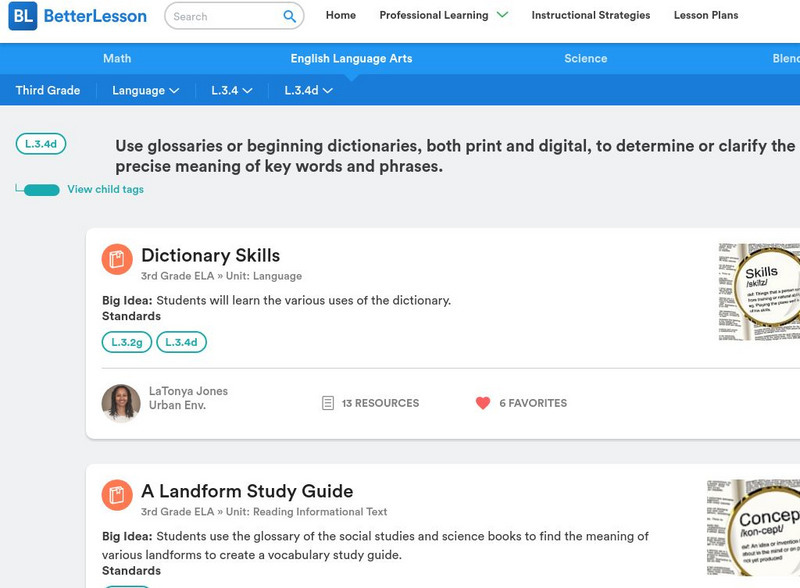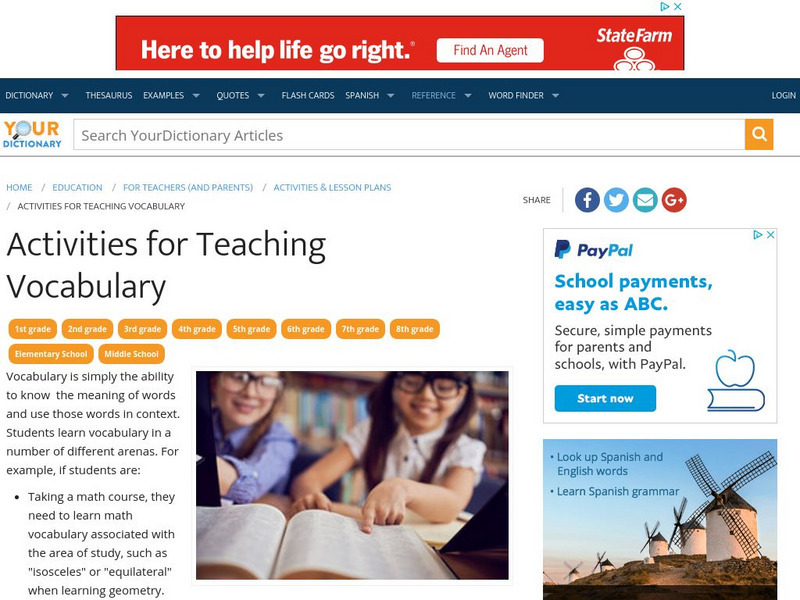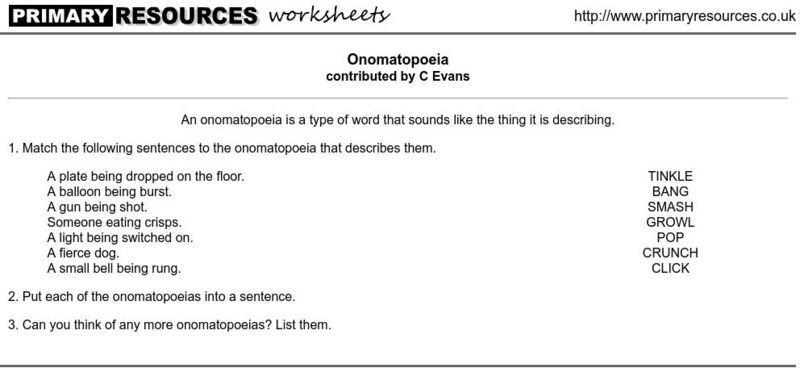Hi, what do you want to do?
Better Lesson
Better Lesson: L.3.5a: Distinguish Literal and Nonliteral Meanings of Words
Links to 18 lessons and activities that build student skills in standard L.3.5a: Distinguish the literal and nonliteral meanings of words and phrases in context (e.g., take steps).
Better Lesson
Better Lesson: L.3.4d: Use Glossaries or Dictionaries to Determine Meaning
Links to 2 lessons and activities that build student skills in standard L.3.4d: Use glossaries or beginning dictionaries, both print and digital, to determine or clarify the precise meaning of key words and phrases.
Reading Rockets
Reading Rockets: Developing Academic Language: Got Words?
This is a research-based article concerning how to best teach academic vocabulary. Research finds that most teachers assign and mention vocabulary, but to be effective, instruction must be direct and meaningful. Recommendations for...
Reading Rockets
Reading Rockets: Reading Topics a to Z: Root Words, Roots, and Affixes
An introduction to using word parts to improve vocabulary skills. Includes charts of common Greek and Latin roots as well as common prefixes and suffixes and their meanings. Each of the four charts can be downloaded.
ICT Games
Ict Games: Pre Loaded Dictionary for Years 1 and 2
A resource that lists vocabulary words for guided writing.
ICT Games
Ict Games: Tell a T Rex
Read these silly sentences and decide which ones make sense. Perfect practice for reading for comprehension.
Florida Center for Reading Research
Florida Center for Reading Research: Morphemic Elements: Make It Meaningful
A lesson plan in which students sort words based on the meanings of their affixes: before, one who, state or qualify of, and wrongly. Materials are included.
Florida Center for Reading Research
Florida Center for Reading Research: Vocabulary: Words in Context [Pdf]
A lesson plan in which students look for new vocabulary words and context clues to define them while reading an independent reading book. Materials are included.
Florida Center for Reading Research
Florida Center for Reading Research: Words in Context: Looking for Meaning [Pdf]
A lesson plan in which students look for the meanings of unknown words in a text. Materials are included.
Florida Center for Reading Research
Florida Center for Reading Research: Morpheme Structures: Word Way [Pdf]
A lesson plan in which students identify unknown words within a text, identify their parts and syllables, and work to determine the meaning of each word. Materials are included.
Florida Center for Reading Research
Florida Center for Reading Research: Morpheme Structures: Four Word [Pdf]
A lesson plan in which students match words according to their base words. Materials are included.
Museum Network (UK)
Greek and Roman Myths: The Gallery
A gallery of artwork from 5 different museums housed in one domain. Search for the Greek or Roman character you are studying and find the appropriate artwork to suit. A "Whos Who" module contains a small description of each character,...
Love To Know Media
Your Dictionary: Activities for Teaching Vocabulary
This article focuses on the importance of teaching vocabulary and how to teach it effectively. It lists concepts that need to be considered when preparing to teach vocabulary such as prior knowledge, dictionary use, context clues, and...
Alabama Learning Exchange
Alex: Using Technology in Teaching Reading
Elementary students, while working on their basal reader story for the week, will use various forms of technology to increase comprehension and other reading skills. (Other strategies may be substituted if some of the technology...
Alabama Learning Exchange
Alex: Figurative Language
This lesson used a slideshow presentation to explain the difference between similes and metaphors. Students are challenged to identify these figurative elements in literature and then create some themselves.
Alabama Learning Exchange
Alex: Let's Write a Cinquain
During this lesson, third grade young scholars will navigate the Internet to learn about cinquains. They will use their new knowledge to create their own cinquains while learning important word processing skills.
South Carolina Educational Television
Know It All: Using Figurative Language to Shape Meaning and Style
The students will be able to identify different types of figurative language in a story and explain how the author uses figurative language to shape the meaning and style of the story.
South Carolina Educational Television
Know It All: Imagine Imagery
Third graders will dive into the word "imagery," learning what it means and using what they learn to describe a color using all 5 senses.
Louisiana Department of Education
Louisiana Doe: Louisiana Believes: Ela Guidebooks: Semantic Mapping
A strategy for developing students' vocabulary by representing the concepts of words graphically. This helps refine their understanding of vocabulary to meet expectations in reading and language.
Primary Resources
Gareth Pitchford's Primary Resources: Onomatopoeia
Simple examples of the literary technique onomatopoeia with two exercises.
Mythweb
Mythweb: Greek Mythology: Perseus
An upbeat retelling of the Greek myth of Perseus. The myth traces the events of his life from his birth through his immortality including his battle with the Gordon Medusa. This modern retelling includes humor, information about myth...
Mythweb
Mythweb: Greek Mythology: The Labors of Heracles from Greek Mythology
A modern retelling of the Greek myth of Heracles, also known in Roman mythology as Hercules. The story begins with Heracles' birth and tells of his twelve labors, including defeating the Nemean Lion, the Hydra, the Minotaur, and more....
Mythweb
Mythweb: Greek Mythology: Bellerophon
A retelling of the Greek myth of Bellerophon in modern language with a casual tone. Learn of Bellerophon's adventures as he fought the Chimaera with the help of the gods and the winged horse Pegasus. This modern retelling includes humor,...











![Florida Center for Reading Research: Vocabulary: Words in Context [Pdf] Lesson Plan Florida Center for Reading Research: Vocabulary: Words in Context [Pdf] Lesson Plan](https://content.lessonplanet.com/knovation/original/509075-bf705fa52db363685aedc39f5902d6e3.jpg?1661787010)
![Florida Center for Reading Research: Words in Context: Looking for Meaning [Pdf] Lesson Plan Florida Center for Reading Research: Words in Context: Looking for Meaning [Pdf] Lesson Plan](https://content.lessonplanet.com/knovation/original/509076-6a14ed968316cda8b9a394daa7faca88.jpg?1661787008)
![Florida Center for Reading Research: Morpheme Structures: Word Way [Pdf] Lesson Plan Florida Center for Reading Research: Morpheme Structures: Word Way [Pdf] Lesson Plan](https://content.lessonplanet.com/knovation/original/509140-36f0ab8539d544c126c0b3347da5c8be.jpg?1661800044)
![Florida Center for Reading Research: Morpheme Structures: Four Word [Pdf] Lesson Plan Florida Center for Reading Research: Morpheme Structures: Four Word [Pdf] Lesson Plan](https://content.lessonplanet.com/knovation/original/509143-0c2841a770815170768c51836e6e8a9a.jpg?1661800040)







